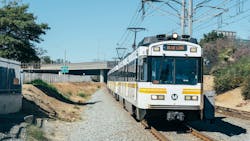L.A. Metro Board approves $2.9 billion in FY 26 transit fund allocations
The Los Angeles County Metropolitan Transportation Authority (L.A. Metro) Board has approved $2.9 billion in fiscal year (FY) 2026 transit fund allocations to help municipal and local transit operators access federal, state and local funding.
“The $2.9 billion in fiscal year 2026 transit fund allocations represents almost 30 percent of [L.A.] Metro’s budget and will ensure continued mobility improvements throughout Los Angeles (L.A.) County, including those areas such as Avalon, Lancaster and Santa Clarita that [L.A.] Metro doesn’t currently serve directly,” said L.A. Metro Board Chair and Whittier City Council Member Fernando Dutra.
L.A. Metro provides oversight and distributes state and federal pass-through grants. The grants, along with funding from locally imposed and collected sales taxes, provide an immediate infusion of resources to 66 transit operators and 89 local jurisdictions for a wide range of local transportation improvements.
L.A. Metro says the board’s approval allows the continued funding of transportation projects, programs and services throughout L.A. County, including:
- California Transportation Development Act (TDA) Article 4, State Transit Assistance and State Bill 1 Funds, which L.A. Metro says provide much needed operating and capital funding for 17 municipal transit operators throughout L.A. County.
- California TDA Article 3 Funds, which are allocated to all 89 jurisdictions based on population and fund the maintenance of regionally significant Class I bike paths, pedestrian enhancements and other bike improvements.
- California TDA Article 8 Funds, which allocate for areas within Los Angeles County but outside the L.A. Metro service area. This includes allocations to Avalon, Lancaster, Palmdale, Santa Clarita and portions of unincorporated areas of L.A. County for transit, street and road projects.
- Clean Fuel Bus Capital Facilities and Rolling Stock Fund, a Measure R ordinance that provides a lump sum allocation of $150 million over the life of the ordinance for clean fuel and bus facilities. This fund is allocated to L.A. Metro and LA County Municipal Operators at $10 million every even year.
- Over $800 million is estimated to be awarded in FY 26 to all L.A. County jurisdictions from the local sales tax measures to support local transportation within their jurisdictional boundaries. Examples include transit services, roadway improvements, bicycle and pedestrian infrastructure, traffic signal coordination and senior dial-a-ride services.
- Measure R allocates 20 percent of the revenues for bus service operations, maintenance and expansion.
- Proposition C (Prop C) Municipal Operators Service Improvement Program, which intends to provide bus service improvements to the transit dependent in L.A. County by reducing overcrowding and expanding services.
- Prop C Transit Service Expansion Program, which was created in 1990 to increase ridership by providing funds for additional services to relieve congestion and continues for eight municipal operators, including Culver City, Foothill Transit, Gardena, Long Beach, Torrance, Antelope Valley, Santa Clarita and the Los Angeles Department of Transportation, for expansion or introduction of fixed-route bus service in congested corridors.
“[L.A.] Metro strives to ensure that all people, regardless of where they live in L.A. County, can benefit from healthier, stronger and safer communities,” said L.A. Metro CEO Stephanie Wiggins. “Thanks to the [L.A.] Metro Board’s action, $2.9 billion will be distributed throughout Los Angeles County to ensure local street, sidewalk, bike lane and active local transportation improvements can continue without delay.”
Fund dispersal will begin this month and continue throughout FY 26.
